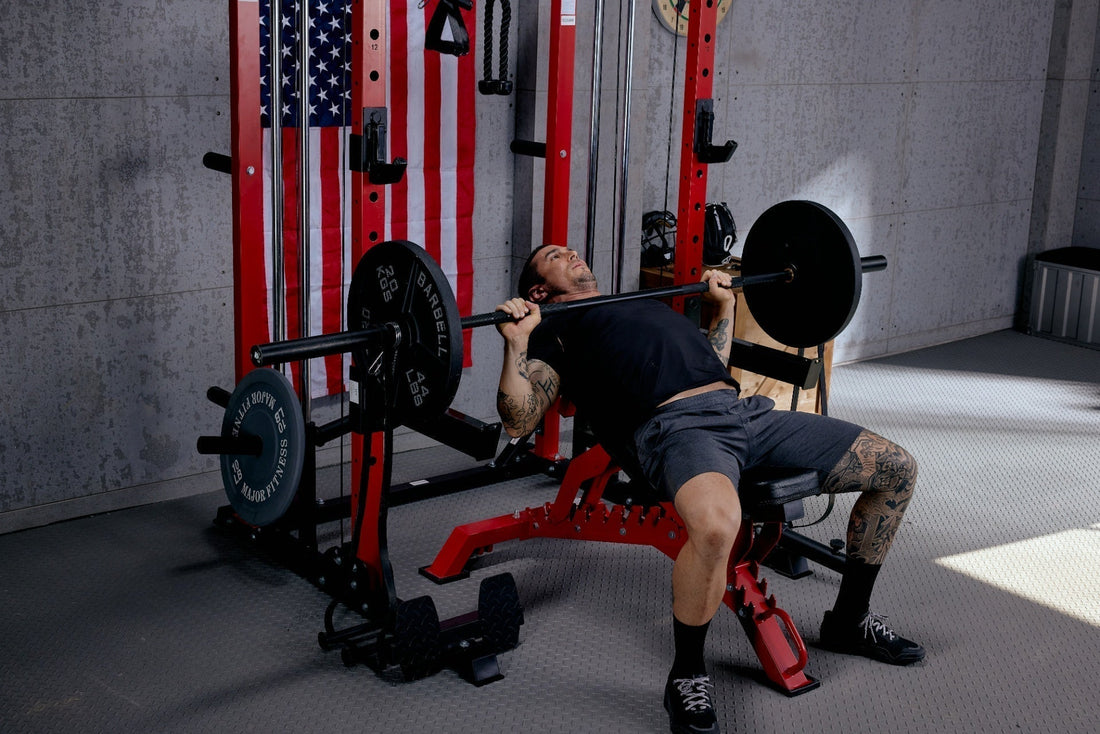
That moment when 100kg of steel hovers above your chest isn't just about weight—it's about proving what a disciplined man can achieve at any stage of life. While others your age are losing ground, you're building strength that commands respect. Major Fitness understands: pressing 100kg (220 lbs) isn't child's play. It's the mark of a man who's put in the work, who knows that real strength comes from consistency, smart training, and refusing to make excuses.
This is where experience meets iron. The 100kg bench press separates those who talk about getting stronger from men who do it. It's not about ego—it's about knowing you can still push your limits, still set the bar higher, and still walk into any gym with the confidence that comes from hard-earned strength. The weight doesn't care that you've got responsibilities or that you're not twenty anymore. But when you handle it with control and power, you're not just lifting weights, you're redefining what's possible for a man in his prime. Here's how to own this weight like the seasoned lifter you are.
When 100kg Bench Press Matters (And When It Doesn't)
The bench press isn't just about chest muscles; it's a test of patience and programming just as much as it is a test of raw upper body strength.
Let's take a look at some hypothetical examples extrapolated from training and information that will help build a foundational understanding :
- A 68kg former marathon runner may take 22 months to go from 60kg to 100kg while maintaining running endurance.
- A 92kg former college linebacker may hit it in 5 months, but might plateau there for nearly a year.
- Competitive powerlifters often treat this as their opener weight for local meets.
Gender Progress Timeline (From No Bench Pressing to Bench Pressing 100kg)
|
Bench Press Weight
|
Male (85kg)
|
Female (65kg)
|
|---|---|---|
|
0kg to 60kg
|
3-6 months
|
6-12 months
|
|
60kg to 80kg
|
4-8 months
|
12-18 months
|
|
80kg to 100kg
|
6-12 months
|
18-36 months
|
*Women reaching 100kg typically compete in 84 kg+ weight classes

The Major Fitness 100kg Blueprint
Hitting a 100kg bench press isn't just about strength—it’s about strategy. While many wonder "Is a 100kg bench press good?" or "What’s an impressive bench press?", the truth is that 100kg (220 lbs) separates casual lifters from serious athletes. Compared to the average bench, this milestone demands precision. Whether you're asking "How heavy is 100kg?" or "What is 100kg in pounds?", the answer is the same: it’s a weight that rewards smart training.
Here's the 3-step system to help you press 100kg and beyond—no guesswork, just results:
1. Form Before Ego - 89% of lifters who failed had elbow flare exceeding 45 degrees. Pro fix: Use the "t-shirt rip" cue - imagine bending the bar like you're tearing your shirt open
2. Specialization Cycles - Lifters who alternated between • 3 weeks of volume (5x5 at 80%) • 2 weeks of intensity (3x3 at 90%) gained 23% faster than those doing random programming
3. The 72-Hour Rule - Successful lifters averaged • 8+ hours sleep on training nights • 1g protein/lb bodyweight • 48-72 hours between heavy bench sessions
FAQ: The Truth About 100kg
1. How long does it take to bench press 100kg?
For most disciplined male lifters (35-55 years old) training 3x/week with proper programming? 12-24 months from scratch. Former athletes might hit it in 6-12 months. The key isn't rushing—it's consistent progression without injury.
2. What weight should I use for reps if my max is 100kg?
Your working sets should follow these benchmarks:
-
Strength (3-5 reps): 85-90kg
-
Hypertrophy (8-12 reps): 70-75kg
-
Endurance (15+ reps): 50-60kg
3. Is a 100kg bench press impressive?
Absolutely. It puts you in the top 20-30% of gym-goers worldwide. For context: the average untrained man benches about 60kg. At 100kg, you’re lifting what most people can’t even budge.
4. How rare is a 100kg bench press globally?
Research suggests only 15-25% of men who train seriously ever hit this mark. Less than 5% of the general male population can do it.
5. What percentage of men can bench 100kg?
In commercial gyms? Roughly 1 in 5 regular lifters. But for men over 40? Fewer than 1 in 10—making it even more impressive if you achieve it later in life.
6. Is lifting 100kg considered strong?
By any objective standard, yes. It's:
-
2x bodyweight for a 50kg lifter
-
1.5x bodyweight for a 67kg lifter
-
Military elite standard for many special forces units





















